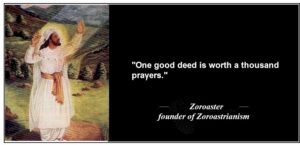This site uses affiliate links to Amazon.com Books for which IANDS can earn an affiliate commission if you click on those links and make purchases through them.
1. About the Author and the Journal
Ken R. Vincent (dies 2024) held a Doctorate in Counseling Psychology from the University of Northern Colorado in 1973. He retired from teaching Psychology and the Psychology of Religious Experience at Houston Community College. He was a member of the Alister Hardy Society for the Study of Spiritual Experience and the International Association of Near-Death Studies (IANDS). He was a founding Board Member of the Christian Universalist Association and the former Webmaster of The Universalist Herald website. Dr. Vincent was the author of several books on NDEs, STEs, and Universalism in World Religions including: The Magi: From Zoroaster to the Three Wise Men: a comparison of the religion of the Magi (Zoroastrianism) to Christianity and shows the parallels of Universal Restoration in both faiths; Visions of God from the Near-Death Experience: The wisdom of the prophets and sages of the world’s religions are superimposed upon the accounts of modern-day near-death experiencers to illustrate the similarities between them; The Golden Thread: God’s Promise of Universal Salvation: documents the solid support for Universal Salvation in the Bible as well as research into NDEs and Mystical / Religious / Spiritual Experiences; and God Is With Us: What Near-Death and Other Spiritually Transformative Experiences Teach Us About God and Afterlife – which examines spiritually transformative experiences in light of Universalist principles found in all the major world religions. Dr. Vincent also has an article published on this website entitled Study of Evidential After-Death Communications.
This article was reprinted with permission from De Numine, No.74, Spring 2023, the journal and newsletter of the Alister Hardy Trust.
2. Universalism: The Heart of Christianity
By the middle of the second century, the ink was dry on the books that would become the New Testament. The newly discovered Gospel of Thomas (about half of which is included in Matthew, Mark, and Luke) didn’t make the cut (Patterson, 2014, 215-216.) The Gospel of John barely made it (Dungan, 1999, 23-25); notably, the contemporary scholars of the Jesus Seminar saw almost nothing of the historical Jesus in the Gospel of John (Funk, et al, 1993, 11, 20).
Concurrent with this major milestone in early Christianity, Christian scholars began writing “theology.” Four basic Christian theologies emerged:
(1) Good works – “Not everyone who says to me, Lord, Lord, will enter the Kingdom of Heaven, but only the one who does the will of my Father in Heaven.” (Matthew 7:21 NRSV) Augustine added that, in addition, you must be a Christian to go to Heaven. In 1965, Vatican II revised that slightly, saying that good works were all that were required since Jesus had died for everyone. So now Jews, Hindus, and even Protestants who are good can go to heaven, but the only certain forgiveness is in the Catholic Church (Hick, 1993, 82-84). When I was 12 years old (in 1955), a Catholic friend kindly told me and another Protestant friend, “not to worry,” because if we were good people on earth, we were destined only for the “top level of Hell” which was sort of like Earth!
(2) Salvation by faith alone – “No one comes to the Father except through me.” (John 14:6 NRSV) This was the theology espoused by Martin Luther and is commonly known in the U.S. as, “Jesus Saves.”
(3) Predestination – “Are not two sparrows sold for a penny? Yet, not one of them will fall to the ground apart from your Father.” (Matthew 10:29) This is the theology espoused by John Calvin. This is no longer in favor, but it is impossible to overstate its huge impact on religion and culture in Western Europe and North America! The UK had to endure religious wars and the dictatorship of Oliver Cromwell and his son, but its roots are deep into the whole of British Colonial/US history.
(4) Universalism – “And I, when I am lifted up from earth, will draw all people to myself.” (John 12:32) This is the theology that God saves everyone either immediately or eventually. It was first espoused by St. Clement of Alexandria in the 2nd century and his pupil, Origen. In Universalism, God is a loving father who disciplines us but never abandons us (Vincent, 2019, 92-93, 163-172).
What proof do we have that one of these theologies is true except by playing, “dueling Bible verses”? Not to worry! I’ve got DATA!
For the past 150 years, my academic colleagues and I have gone all over the world to analyze how human beings experience God. Whatever their religion (or lack of it), about 40-65% surveyed in the UK, US, Europe, China, India, Japan, Turkey, Iran, Africa, and Latin America (Rankin, 2008) 231-239), they tell us they experience God as LIGHT, God as SPIRIT, and God as LOVE.
A minority of people tell us they experience God in human form, much like the Angel of the Lord in the Hebrew Bible. Usually these divine beings are Saviors who can keep you out of hell or get you out of hell (Jesus, Mary, Krishna, Khuan Yin, Amida Buddha). As any student of comparative religion knows, the “saints,” “angels,” and “jinn” of the West are the same as the “small g” gods of the East and in ancient times.
Here are some examples from my near-death experience cases:
“An absolute white Light that is God-all loving. The unification of us with our Creator.” (Vincent, 1994, p. 27)
“I left my body, and I was surrounded by God. It didn’t feel male or female, young or old, just me. I was surrounded by Love … I looked down at the little girl in bed … Later when I realized it was me, I was back in my body.” (Vincent, 1994, p. 21)
“It is something which becomes you and you become it. I could say, “I was peace; I was love.” It was the brightness … It was part of me.” (Vincent, 1994, p. 29)
“The light was in me and between the molecules, the cells in my body. He was in me – I was in him … I knew all things. I saw all things. I was all things. But not me; Jesus had this. As long as I was “in Him,” and he was “in me,” I had this power, this glory (for lack of a better word).” (Vincent 1994, p. 57)
Our research indicates that, of the four basic Christian theologies, Universalism’s image of God matches that of people the world over who, in transpersonal experiences and mystical experiences of God, tell of a God of unconditional love who would not condemn anyone to eternal hell. In short, Universalism “wins” when explaining how real people experience God. Admittedly, although the “idea” of Universalism is well, “universal,” many researchers of religious/spiritual experience don’t know the origins of the theology behind it. In Christian history, a minority of Universalists (like Hosea Ballou) believed that there was no hell. However, the majority of Universalists from Clement of Alexandria in the 2nd century and his pupil Origen down to the present day have believed that hell exists but is not permanent. In other words, all people will be saved immediately or eventually.
Our data from thousands of research cases from near-death experiences, death-bed visions, after-death communications, and mystical experiences tell us that most people are “first round draft choices.” Also, folks get out of hell quickly if they call out to God or (in the West) Jesus as this example shows:
“God, I am not ready, please help me. I remember when I screamed (this) an arm shot out of the sky and grabbed my hand and at the last second I was kept from falling off the end of the funnel, the lights flashing; and the heat was really something.” (Greyson and Bush, 1992, p.100)
In this negative experience, the person is told that she will be in “limbo” for a long time, but a long time is not forever:
“It was not peaceful, much baggage, much unfinished business. All things are connected. You are not your body, you are a soul; mine was in limbo. I knew I would be in limbo for a long time. I had a life review and was sent to the void.” (Vincent 1994, p. 119)
Here are two examples of people being given tours of the afterlife:
The eighteenth century physician and preacher Dr. George De Benneville died of a “consumption-like illness” but revived at his wake. He told of being given a tour of the afterlife by two angels and that he saw people being taken out of hell and up to heaven when they had repented. (The full text of his autobiographical experience is in Vincent, 2019, 103-116.)
Another example is the near-death experience of the psychiatrist Dr. George Ritchie who was dead for 7 minutes and was given a tour of heaven and hell by Jesus himself. In all of the levels of hell, there were beings of light waiting to assist the lost souls (Ritchie, 1998, 28-46).
Folks sometimes have after-death communications from people who say they are in hell but who later appear to their loved ones and say that their time in hell “is over “ (Guggenheim, 1996, 239-242, and Haraldsson, 2012, 100-101).
Is all this religious experience true? We do not have PROOF that God communicates with humans or that there is life after death, but we do have evidence for it. I, personally, find the evidence compelling. The Society for Psychical Research (founded in 1882) did much of the early research into afterlife. In 1969, Sir Alister Hardy founded the Religious Experience Research Unit (now Centre) which now has accumulated over 6,000 cases of religious/spiritual experiences.
At the dawn of the 21st century, Titus Rivas, et.al, published The Self Does Not Die (2016) presenting over a hundred cases in which the near-death experiencer returned with verifiable information. More recently, Evelyn Elsaesser and her colleagues completed a study of 1,004 after-death communications; many of these cases are evidential (Elsaesser, 2020).
I myself have recently completed a study of 1,600 after-death communications in which I found 20.1% were evidential (Vincent, 2022).
Jesus got it right when he called God, “Our Father,” — a loving father who will not give up on us until we are all “safely home!”
One thing that Universalism has taught me is the humbling thought that God loves each and every person on the planet as much as God loves me. In the end, the end, God will save the “Lost Sheep” (Matthew 18:10-14) and the “Prodigal Son” (Luke 15:11-32). That to me is the heart of Christianity.
3. References
Dungan,D.L. 1999) A History of the Synoptic Problem, Yale University Press.
Elsaesser,E. (2020) Investigation of the Impact of Spontaneous and Direct After-Death Communications (ADCs):Research Findings, www.adcrp.org/ publications
Funk,R. et al (!993) The Five Gospels, Harper One.
Greyson, B. and Bush, N. E. (1992) Distressing Near-Death Experiences, Psychiatry, 55,95-110.
Guggenheim, B. and J. (1997) Hello From Heaven, Bantum Books.
Haraldsson, E, (2012) The Departed Among the Living, White Crow Books.
Hick, J .(1993) Disputed Questions in Theology and the Philosophy of Religion, Yale University Press.
Patterson, S.J. (2014) The Lost Way, Harper One.
Rankin, M. (2008) Religious & Spiritual Experience, Continnum Books.
Ritchie, G. G. (1998) My Life After Dying, Hampton Roads.
Rivas, T et al (2016) The Self Does Not Die, IANDS.
Vincent, K.R. (1994) Visions of God From the Near-Death Experience, Larson Publications.
Vincent, K.R. (2019) God Is With Us, What Near-Death and Other Spiritually Transformative Experiences Teach Us About God and Afterlife, White Crow Books.
Vincent, K. R. (2021) Evidential After-Death Communications, De Numine,70 ,4-6.




















